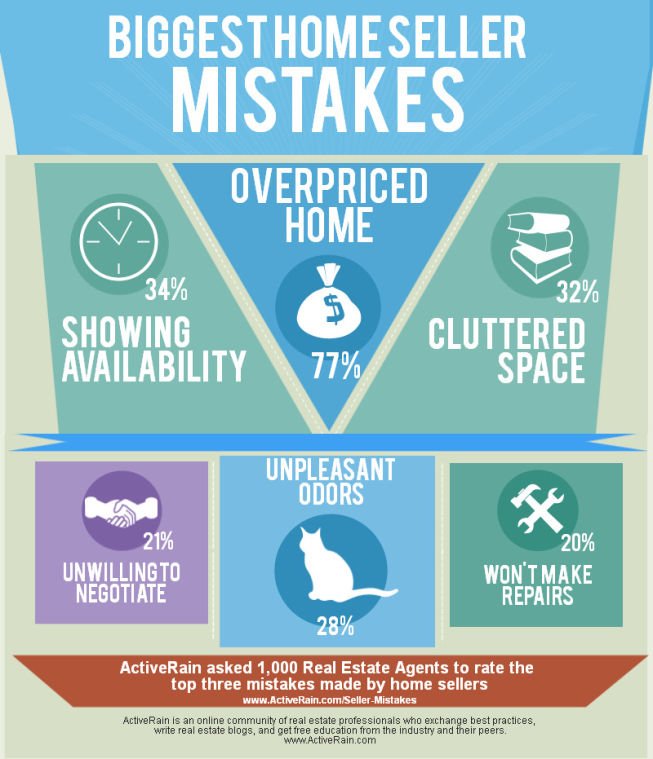
As 2014 proceeds, we will each be affected by the real estate market in one way or another. Perhaps you or a neighbor will decide this is the year to sell. Contrary to popular belief, there are buyers looking for homes during every “market” and the six conditions cited in this article and the infographic could make those buyers shy away from your home.
Overpriced homes. If you want to sell your home, do not overprice it. Your listing agent will make recommendations based on comparable properties. Market value and appraisals are established based on recent sales and what buyers will pay. If you want more for your home than the market supports, you may want to wait until homes comparable to yours increase in sales price.
Showing Availability. Make your home available for agents and buyers to see it. Generally speaking, the more people who see your home, the more likely you’ll get the offer you need. Restricting the showing times will virtually guarantee that a highly qualified buyer will not see your home.
Cluttered Space. It is critical that buyers are able to envision their lives and how they will display their treasures as the new owners. If buyers are distracted by your photos, keepsakes and furniture, they may question whether or not you’re really selling. Demonstrate your commitment to sell by packing away your personal treasures before listing your home for sale. This may also help reduce your stress prior to the sale closing.
Unpleasant Odors. Clean like there’s a white-glove inspection, and that includes deodorizing. Let’s face it, if strong odors greet visitors, they may not even cross the threshold. Animal, smoke, chemical and food smells are the largest offenders of the nostril. Some scents may seem natural to you, but to others they can trigger repressed memories or allergic reactions, etc.. Always expect your home to be viewed by a potential buyer and take precautions to keep everything clean and fresh.
Unwilling to Negotiate. Not unlike overpricing your home, refusing to negotiate can terminate a sale. As the Seller, you want top dollar for your home. Buyers, as you would expect, want a good deal. By pricing your home well up front, you reduce your chances of needing to negotiate. Selecting an agent with strong negotiation experience can be to your advantage.
Won’t Make Repairs. Selling “As-Is” can backfire in more ways than one. California real estate is sold based on the premise that all sales are “as-is” however that doesn’t relieve you of disclosing material facts. Similarly, by not making improvements, or flat-out refusing to make repairs, you reduce the pool of buyers who would otherwise consider your home. When inspectors go through your home and point out concerns to the buyer, there is an opportunity to negotiate on what repairs or cost adjustments make sense. You’re under no obligation to make the repairs or lower the price. However, your inner motivation may suggest that’s the best approach if you truly want to sell.
This information is provided based on the results of a recent poll I participated in with more than 1,000 other real estate agents in the ActiveRain online real estate community. Additional pitfalls are noted at http://www.activerain.com/seller-mistakes.
There are many factors and conditions that impact selling your home. Each situation is different and you are well advised to consider the professional you hire.
As always, let’s foresee the possibilities . . . and get results!













